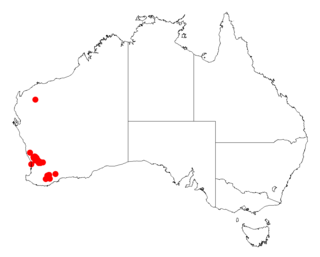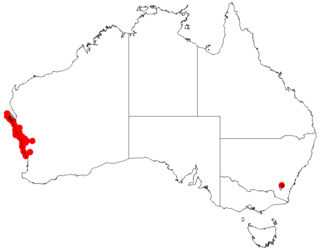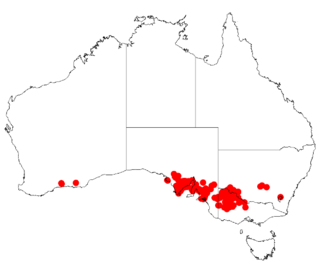
Acacia acinacea, commonly known as gold dust wattle, is a flowering shrub. It is native to south eastern Australia and lives for 15 years on average. This wattle species is tolerant of drought and frost. It is also known as wreath wattle or round-leaf wattle.

Acacia notabilis, known colloquially as mallee golden wattle, Flinders wattle or stiff golden wattle, is a species of Acacia native to Australia.

Acacia williamsonii, known colloquially as Whirrakee wattle, is a species of Acacia that is endemic to the Bendigo region of Victoria. Naturalised populations also exist in Southern and Northern NSW.

Acacia filifolia is a shrub belonging to the genus Acacia and the subgenus Juliflorae that is endemic to western Australia.

Acacia latior is a shrub belonging to the genus Acacia and the subgenus Juliflorae that is endemic to western Australia.

Acacia crassistipula is a shrub belonging to the genus Acacia and the subgenus Phyllodineae that is endemic to western Australia.
Acacia erioclada is a shrub belonging to the genus Acacia and the subgenus Phyllodineae native to Western Australia.

Acacia idiomorpha is a shrub belonging to the genus Acacia and the subgenus Phyllodineae that is endemic to a small area of western Australia.

Acacia pachyphylla is a shrub belonging to the genus Acacia and the subgenus Phyllodineae that is endemic to south western Australia.

Acacia pycnocephala is a shrub of the genus Acacia and the subgenus Phyllodineae that is endemic to south western Australia.

Acacia quinquenervia is a shrub of the genus Acacia and the subgenus Phyllodineae that is endemic to south western Australia

Acacia colletioides, commonly known as wait-a-while, pin bush and spine bush, is a shrub of the genus Acacia and the subgenus Plurinerves that is native to Australia.

Acacia hadrophylla is a shrub of the genus Acacia and the subgenus Plurinerves that is endemic to south western Australia.

Acacia nyssophylla, commonly known as pin bush, wait a while and spine bush, is a shrub of the genus Acacia and the subgenus Plurinerves that is endemic to a large area of central and south-western and southern Australia.

Acacia uncinella is a shrub of the genus Acacia and the subgenus Plurinerves that is endemic to an area of south western Australia.

Acacia trineura, known colloquially as three-nerve wattle or three nerved wattle or green wattle, is a species of Acacia native to south eastern Australia.

Acacia halliana is a shrub belonging to the genus Acacia and the subgenus Phyllodineae that is native to parts of south eastern Australia.

Acacia kybeanensis, commonly known as kybean wattle or kybeyan wattle, is a shrub of the genus Acacia and the subgenus Phyllodineae that is endemic to south eastern Australia.

Acacia microcarpa, commonly known as manna wattle, is a shrub belonging to the genus Acacia and the subgenus Phyllodineae endemic to south eastern Australia.

Acacia curranii, also known as curly-bark wattle, is a shrub belonging to the genus Acacia and the subgenus Juliflorae that is native to north eastern Australia. It is listed as vulnerable under the Environment Protection and Biodiversity Conservation Act 1999.



















